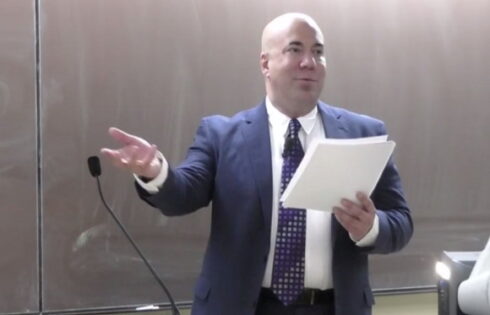
Extra child may cause ‘suffering,’ ‘death’ due to carbon impact
A University of Arizona professor urged couples who are dreaming about having a large family to reconsider their plans because of children’s “harm” on the environment.
In an article at The Conversation, philosophy Professor Trevor Hedberg said having a large family may be unethical because children produce more carbon emissions than can be offset by recycling and driving fuel-efficient cars.
Worse, one extra child “may be responsible for the severe suffering, or even death, of one or two future people” because of their impact on the environment, he wrote.
Hedberg said he believes children occupy a “messy” space somewhere in the middle between luxury and necessity.
“For most people today, having their own biological children is not essential to health or survival,” he wrote.
On the contrary, he said not having as many children may be essential for future human beings and the environment. He did not put a number on how many children he believes is too many.
Hedberg wrote:
If emissions stayed similar to 2005 levels for several generations, an American couple having one fewer child would save 9,441 metric tons of CO2-equivalent, according to their calculations. Driving a more fuel-efficient car, on the other hand – getting 10 more miles to the gallon – would save only 148 metric tons of CO2-equivalent.
Philosopher John Nolt has attempted to estimate how much harm the average American causes over their lifetime in terms of greenhouse gas emissions. He found that the average American contributes roughly one two-billionth of the total greenhouse gases that cause climate change. But since climate change may harm billions of people over the next millennium, this person may be responsible for the severe suffering, or even death, of one or two future people.
He said recycling, driving fuel-efficient vehicles, shopping locally, and donating to offset carbon footprints are not enough to rectify the environmental problems that extra children would cause.
Having a child “vastly outweighs the impact of these activities,” he wrote.
Many college students have embraced similar thinking. An August 2023 poll by Young America’s Foundation found two thirds believe climate change is an “existential threat,” and nearly one third would give up having children to “mitigate” the perceived problem.
However, some academics are pushing back against anti-child arguments, contending that having children benefits individuals and society in moral, relational, and economic ways. Others say concerns about climate change and overpopulation are exaggerated or false.
Meanwhile, leaders in many European and Asian countries are expressing fears about too few children being born, according to a 2023 United Nations Population Fund report. Due to consistently low birth rates, their populations are aging and fewer young people exist to contribute to the workforce, retirement programs, and elderly care.
MORE: Discredited Stanford biologist clings to alarmist overpopulation claims
IMAGE: Alberto Garcia Guillen/Shutterstock
Like The College Fix on Facebook / Follow us on Twitter







Please join the conversation about our stories on Facebook, Twitter, Instagram, Reddit, MeWe, Rumble, Gab, Minds and Gettr.